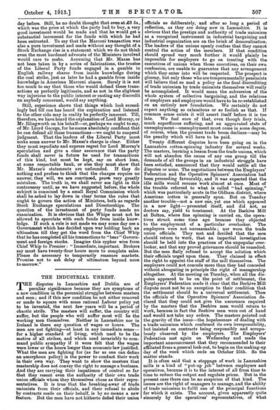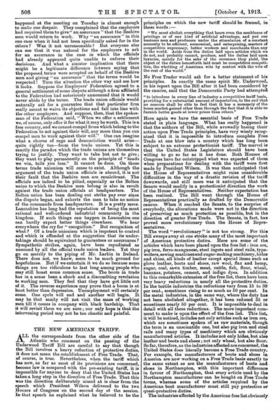THE INDUSTRIAL UNREST. T HE disputes in Lancashire and Dublin are
of peculiar significance because they are symptoms of a new condition in the perennial struggles between masters and men ; and if this new condition be not either removed or made to square with some rational Labour policy yet to be invented, the next few years will be a. period of chaotic strife. The masters will suffer, the country will suffer, but the people who will suffer most will be the working men themselves. Neither in Lancashire nor in Ireland is there any question of wages or hours. The men are not fighting—at least in any immediate sense— for a higher standard of living, which used to be the motive of all strikes, and which used invariably to com- mand public sympathy if it were felt that the wages were lower or the hours longer than economic law justified. What the men are fighting for (as far as one can define an amorphous policy) is the power to conduct their work in their own way. They want to show the masters that mastership does not convey the right to manage a business. And they are carrying their impatience of control so far that they resent oven the authority of their own trade union officials whom they themselves chose as their repre- sentatives. It is true that the breaking-away of trade unionists from their officials, and their refusal to abide by contracts made on their behalf, is by no means a new feature. But the men have not hitherto defied their union officials so deliberately, and after so long a period of reflection, as they are doing now in Lancashire. It is obvious that the prestige and authority of trade unionism as a recognized instrument in industrial bargaining and industrial organization are on the brink of demoralization. The leaders of the unions openly confess that they cannot control the action of the members. If that condition should spread very much further it would plainly be impossible for employers to go on treating with the executives of unions when those executives, on their own confession, are unable to guarantee that any arrangement which they enter into will be respected. The prospect is gloomy, but only those who are temperamentally pessimists will believe that so mad a policy as the final discrediting of trade unionism by trade unionists themselves will really be accomplished. It would mean the subversion of the whole system of collective bargaining, and the relations of employers and employees would have to be re-established on an entirely new foundation. We certainly do not expect anything so calamitous or so foolish as that. If common sense exists it will assert itself before it is too late. We feel sure of that, even though fiery trials, much superfluous suffering, and an aggravated state of unemployment—unemployment must come in some degree, of course, when the present trade boom declines—may be the penalty which will have to be paid.
Twenty different disputes have been going on in the Lancashire cotton-spinning industry for several weeks. The masters, learning a lesson from the trade unions, which will not abandon the cause of any one group till the demands of all the groups in an industrial struggle have been satisfied, announced that they would settle all the disputes or none. The negotiations between the Employers' Federation and the Operative Spinners' Association had been proceeding favourably, and it was expected that the idle mills would resume work almost at once. Most of the trouble referred to what is called " bad spinning," which was particularly acute in the Oldham district, where American cotton is generally spun. But on Tuesday another trouble—not a new one, yet one which appeared in a new light — presented itself, and did not, as doctors say, yield to treatment. At the Beehive Mill at Bolton, where fine spinning is carried on, the opera- tives struck some time ago because they objected to the employment of a particular overlooker. The employers were not unreasonable ; nor were the trade union officials. They met and decided. that the men should return to work, that an impartial investigation should be held into the practices of the unpopular over- looker, and that any proved grievances should be remedied. But the men flatly refused to accept the solution which their officials urged upon them. They claimed in effect the right to appoint the staff of the mill themselves. The employers could not concede more than they had conceded without abrogating in principle the right of managership altogether. At the meeting on Tuesday, when all the dis- putes appeared to be on the point of settlement, the Employers' Federation made it clear that the Beehive Mill dispute must not be an exception to their condition that the settlement should be a universal settlement. Then the officials of the Operative Spinners' Association de- clared that they could not give the assurance required by the masters that the Beehive men would return to work, because in fact the Beehive men were out of hand and would not take any orders. The masters pointed out the gravity of the issue—the hopelessness of dealing with a trade unionism which confessed its own irresponsibility, but insisted on contracts being responsibly and scrupu- lously observed by the employers. The Employers' Federation met again on Wednesday and made the important announcement that they recommended to their affiliated firms a general lock-out, to begin on the making-up day of the week which ends on October 25th. So the matter stands.
It is often said that a stoppage of work in Lancashire mills is a kind of "put-up job" between employers and operatives, because it is to the interest of all from time to time to reduce the output and regulate prices. But in the present case there can be no suspicion of that kind. The issues are the right of managers to manage, and the ability of trade unionism to fulfil one of the principal functions for which it exists. The account, given apparently quite sincerely by the operatives' representatives, of what happened at the meeting on Tuesday is almost enough to make one despair. They complained that the employers had required them to give" an assurance " that the Beehive men would return to work. Why " an assurance " in this one case when it had not been specifically asked for in the others ? Was it not unreasonable ? But everyone else can see that it was natural for the employers to ask for an assurance in the case in which the officials had already appeared quite unable to enforce their decisions. And what a sinister implication that there might be a legitimate difference between saying that the proposed terms were accepted on behalf of the Beehive men and giving " au assurance " that the terms would be respected ! Turn the situation the other way and see how it looks. Suppose the Employers' Federation agreed to a general settlement of some dispute although a firm affiliated to the Federation had notoriously announced that it would never abide by the terms. The trade union officials would naturally ask for a guarantee that that particular firm really meant to waive its objections and fall into line with the other employers. And suppose, then, that the spokes- man of the Federation said, " When we offer a settlement we, of course, only offer it for what it may be worth. This is a free country, and we cannot compel firms which belong to the Federation to act against their will, any more than you can compel men to work against their will." One can imagine what a chorus of rage and denunciation would arise— quite rightly too--from the trade unions. Yet this is exactly the paradox which the trade unions are themselves trying to justify. They want to take but not to give ; they want to play permanently on the principle of " heads we win, tails you lose." It cannot be done. On those terms trade unionism will cease to exist. Although the argument of the trade union officials is absurd, it is not their fault that the Beehive men are recalcitrant. The officials are indeed to be pitied, especially as the Bolton union to which the Beehive men belong is also in revolt against the trade union officials at headquarters. The Bolton union has been dealing out strike pay ever since the dispute began, and exhorts the men to take no notice of the commands from headquarters. It is a pretty mess. Lancashire has long had the reputation of being the most rational and well-ordered industrial community in the kingdom. If such things can happen in Lancashire one can hardly expect better things elsewhere. We hear everywhere the cry for " recognition." But recognition of what ? Of a trade unionism which is impotent to control and which is offended at the suggestion that its under- takings should be equivalent to guarantees or assurances ? Sympathetic strikes, again, have been repudiated as unsound by all the official trade union leaders. Yet they go on merrily to the piping of Mr. Larkin in Ireland. There does not, we know, seem to be much ground for hopefulness. But if we entertain it we do so because some things are too ridiculous to last long among people who may still boast some common sense. The boom in trade has in a sense been a shock and a discomfiting revelation to working men. They feel that they have got little out of it. The reverse experience may prove that a boom is at least better than depression. Unemployment will certainly come. One cycle will end and another will begin. It may be that sanity will not visit the mass of working men till it comes in company with black hardship. That it will revisit them we are sure ; our only hope is that the intervening period may not be too chaotic and painful.



































































 Previous page
Previous page